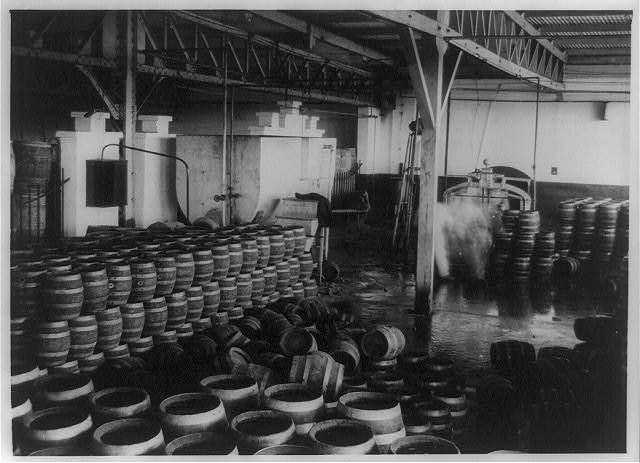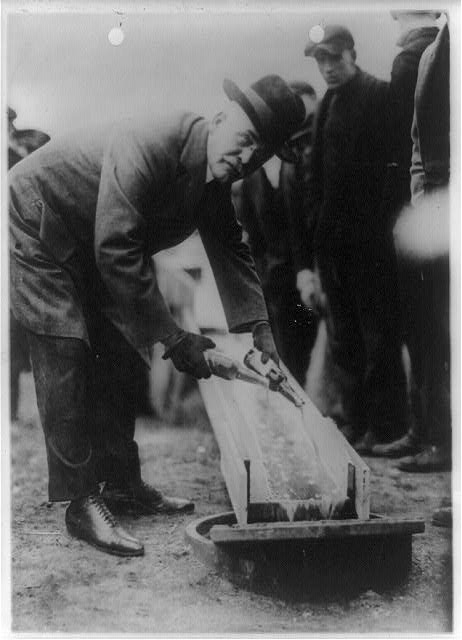Cheers to 90 Year: Paso Robles Wineries and the End of Prohibition
December 5, 2023
December 5, 2023, marks 90 years since the repeal of the 18th Amendment, ending Prohibition. So pour yourself a glass of wine to celebrate as we take you through how Paso Robles survived the Prohibition era.
Paso Robles is an area that has exponentially grown as a wine country in recent years. Andrew York opened the first winery in 1882 and today there are hundreds of wineries to enjoy. So what exactly did the Paso Robles Prohibition look like 90 years ago and why is California home to a large number of Pre-Prohibition wineries that still exist today?

While the Prohibition in California was devastating to growing wine areas like Napa, San Luis Obispo (SLO) County was one of the few areas in the United States that did not slow down during this period. In fact, winemaking increased during the 1920s.
In October 1919, the Volstead Act, or the 18th Amendment, was passed which prohibited the manufacture, sale, and transportation of alcohol, but did not outlaw the sale of grapes. Therefore, existing vineyards were able to continue growing and selling wine grapes.
While a large portion of winemakers in the United States walked away from winemaking and their vineyards, the Italian-Americans, French-Americans, and German-Americans were already making their own wine at home. During Prohibition, they would purchase grapes from the SLO County vineyards and continue making wine at home. This put SLO county on the map for its vineyards and grapes as they were being sent around the country for home winemaking.
Many modern-day Paso Robles wineries and vineyards were able to contribute and grow due to home winemaking during this period. In fact, York Mountain Winery led by Andrew York and his children, planted Zinfandel in the 1910s and was able to sell grapes to home winemakers and produce wine for medicinal and religious purposes throughout the 1920s.

Ignacy Paderewski was another Paso Robles winemaker who was able to find success during the Prohibition era. Paderewski was a Polish pianist and composer who originally found Paso Robles for the hot springs to heal his arthritic hands. He later bought a property in the Adelaida District and planted 200 acres of Zinfandel. During Prohibition, he sold his grapes to locals and later worked with York Mountain Winery to produce award-winning wine post-Prohibition.
In order to keep grapes from rotting while shipping to the East Coast, grape growers would create wine bricks, which consisted of concentrated grape juice. Wine businesses were required to include a label that the wine bricks were for non-alcoholic purposes only. However, the law did not state that the wine brick's labels couldn't include very specific instructions on how not to make wine. Therefore, home winemakers would follow the "how not to" instructions to create wine by dissolving it in water and fermenting it in their cupboards for three weeks.
SLO County and Paso Robles were known for their speakeasies and some wineries even sold wine directly to locals. However, law enforcement in the area was strict, and many spent time in jail for home winemaking or selling wine.
On December 5th, 1933 Congress passed the 21st Amendment thus repealing the Volstead Act and ending Prohibition. California wineries opened their doors and began making wine publicly again, although the quality at first was low. However, the following year, Paderewski's wine made by the York brothers won a gold medal at the California State Fair, proving the quality of Paso Robles soil and winemakers.

While Prohibition limited the quality of the California wine industry, home winemaking is what allowed the Paso Robles Wine Country to survive and prosper. Vineyard acreage actually increased in SLO Country during the 1920s. The hard work and grit of winemakers during the Paso Robles Prohibition era paved the way for the region to be what it is today.
With over 400 wineries, SLO County has become a flourishing wine country growing varietals from all over the world. York Mountain Winery remains a prominent estate, now known as Epoch Estate and Paderewski Vineyards is still known to produce high-quality grapes for Paso Robles wineries.
BENOM is proud to call Paso Robles our home. The determination of the viticulturists and winemakers during the Paso Robles Prohibition era has made an impact on our wines as we currently source fruit from Paderewski Vineyard, owned by Epoch Estate Winery and the Armstrong family, and have recently purchased our estate in York Mountain AVA near Epoch Winery.

